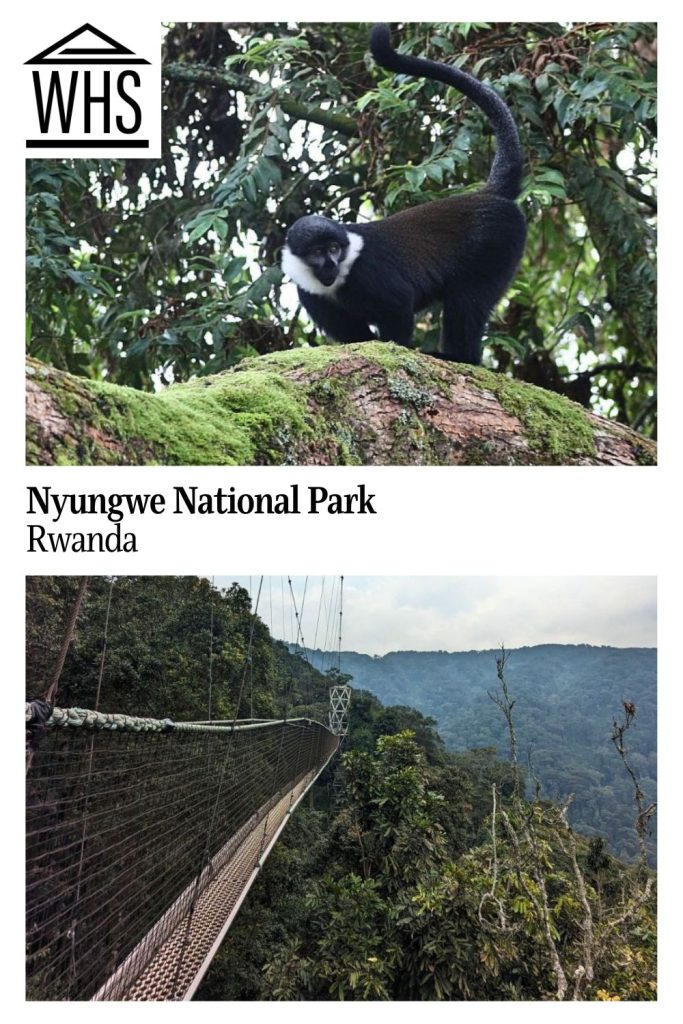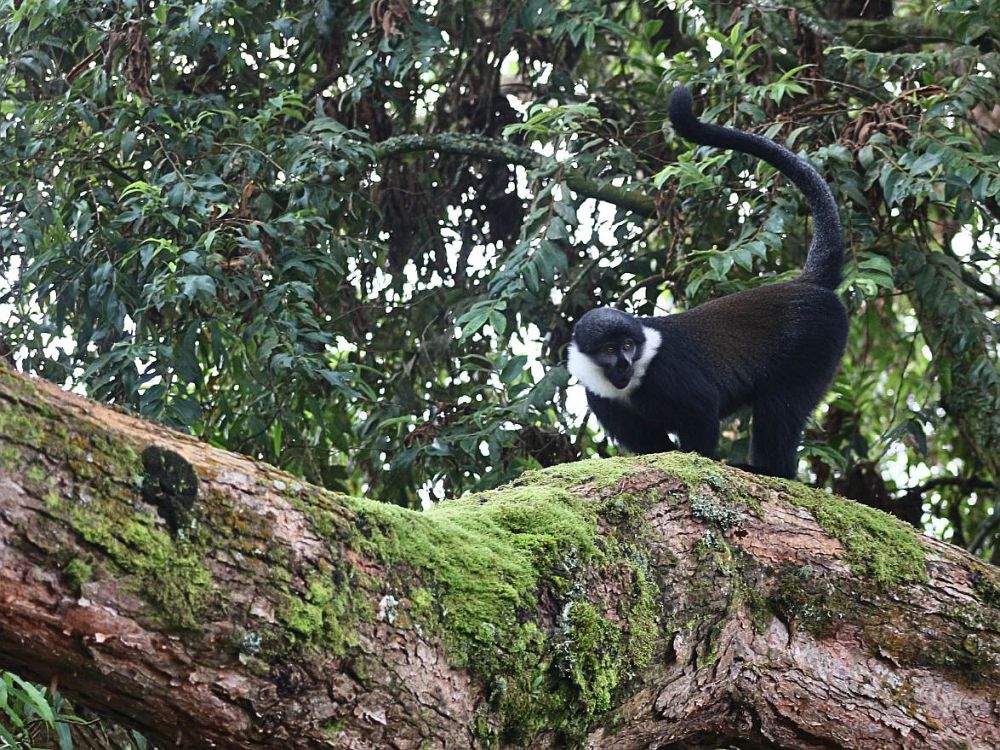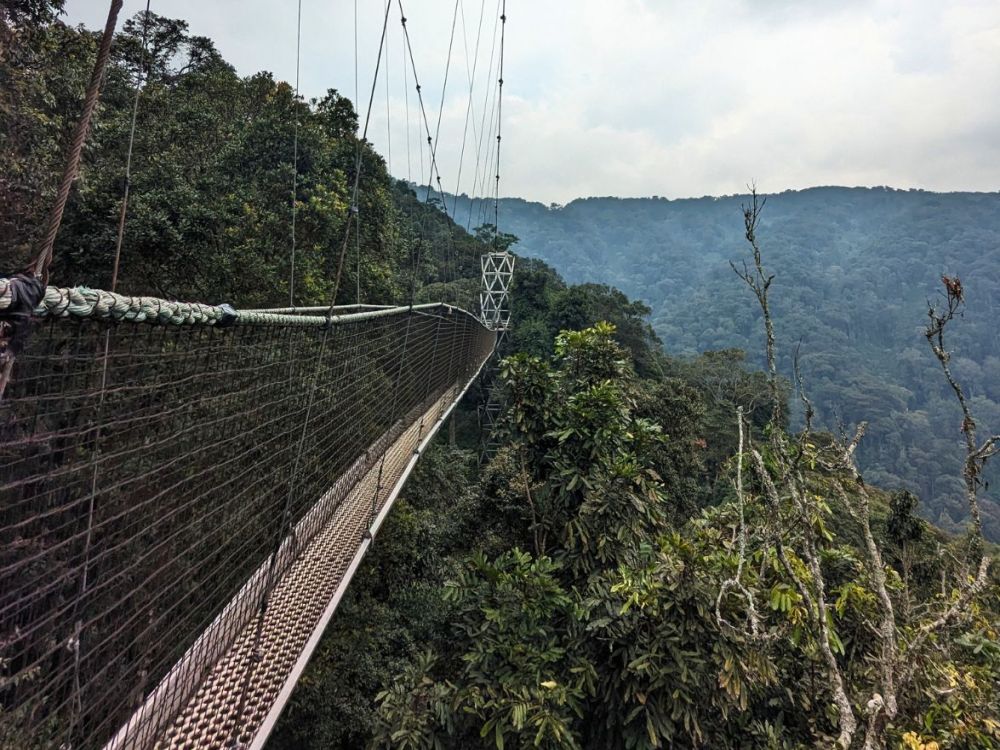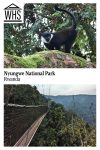Nyungwe National Park
By Pamela Drager
What is Nyungwe National Park?
Nyungwe National Park is a remarkable nature reserve in the central highlands of Africa, a part of the Albertine Rift. It’s an extremely biodiverse region. Spanning an impressive 1,019 square kilometers (393 square miles), this national park showcases a stunning array of lush rainforests, rolling hills, deep ravines, and rare wildlife, providing visitors with a unique and unforgettable experience.
Disclosure: This article contains affiliate links. Making a purchase through an affiliate link will mean a small commission for this website. This will not affect your price.
The park is renowned for its ancient montane rainforest, which is estimated to be around 200 million years old, making it one of the oldest forests in Africa. This incredible ecosystem is home to over 1,000 plant species, including several endemic ones found nowhere else in the world.

The park boasts an extraordinary diversity of primates: 13 different species including chimpanzees, colobus monkeys, and golden monkeys. For those seeking a unique wildlife encounter, chimpanzee tracking is a must-do activity. Accompanied by experienced guides, visitors can search the forest for these delightful creatures. The chance to observe chimpanzees up close, swinging from trees and communicating with each other, is an experience that will leave a lasting impression.
Why is Nyungwe National Park a UNESCO World Heritage site?
Nyungwe National Park was designated as a UNESCO World Heritage site in 2004 due to its ecosystems and because of the many species it supports.
The park’s diverse landscapes, ranging from bamboo forests and peatlands to swamps and waterfalls, contribute to its aesthetic value and attract nature enthusiasts from around the world. The open and closed canopy forests maintain a “dynamic equilibrium,” according to UNESCO, as do other overlapping ecosystems such as the peatlands within the park. The peatlands, UNESCO’s Executive Summary states, also “preserve exceptional pollen archives spanning several hundred thousands of years.”
The park is recognized for its exceptional biodiversity, hosting an impressive variety of plant and animal species, many of which are endemic to the region. The rainforests of Nyungwe are a sanctuary for numerous rare and endangered species, including primates, birds, amphibians, and plants, making it a globally significant conservation area.
The park’s rich vegetation is home to 13 different primate species, including the endangered chimpanzee and the threatened Rwenzori colobus monkey. Nyungwe also boasts over 300 bird species, making it a haven for birdwatchers and ornithologists. Some notable bird species in Nyungwe include the great blue turaco, Ruwenzori turaco, and various species of sunbirds.

What can you expect on a visit to Nyungwe?
When visiting Nyungwe National Park, travelers can expect an unforgettable experience surrounded by breathtaking natural beauty and awe-inspiring wildlife. The park offers a range of activities for visitors to immerse themselves in the wonders of this unique ecosystem. One of the highlights is trekking to observe the renowned chimpanzees in their natural habitat. Guided hikes through the dense rainforest provide opportunities to witness these magnificent creatures in action.
Nyungwe also offers numerous hiking trails of varying difficulty, allowing visitors to explore the park’s diverse landscapes, encounter rare bird species, and enjoy stunning views from waterfalls and towering canopies. For those seeking a more adventurous experience, canopy walks suspended above the treetops provide a thrilling perspective of the park’s lush canopy and its inhabitants.
Is Nyungwe National Park worth visiting?
Nyungwe National Park is worth visiting for nature enthusiasts and adventure seekers. With its remarkable biodiversity, stunning landscapes, and unique range of activities, the park offers a truly unforgettable experience. Whether it’s trekking to observe chimpanzees in their natural habitat, exploring diverse hiking trails, or undertaking thrilling canopy walks, you will be immersed in the wonders of this pristine ecosystem.

What sorts of travelers would like Nyungwe National Park?
Any traveler who loves being out in nature would love Nyungwe National Park.
Tips for visiting Nyungwe National Park
Book your accommodations and activities well in advance, especially if you are looking to trek with the chimpanzees or participate in guided hikes. Always follow your guide’s advice in order to protect the animals and the environment. Be sure not to leave any trash behind. Stay on marked paths.
The weather in Nyungwe National Park can be unpredictable, with rain showers and temperature fluctuations throughout the year. It’s important to pack suitable clothing for all weather conditions, including waterproof gear, sturdy hiking shoes, and layers.
If you want to stay right in the park, there are a few park-run self-catering guest houses and two campgrounds. Otherwise, there are various hotel options outside the park, marked on the map below:
Visit a travel medicine clinic before your trip to make sure you are up to date on your vaccinations and to see if you need to take prophylactic medication for malaria prevention.
Kahuzi-Biega National Park is another UNESCO site nature reserve over the border in the Democratic Republic of Congo. Generally, visitors go there via tours from Kigali.
Where is Nyungwe National Park?
Nyungwe National Park is located in southwestern Rwanda, near the border with Burundi and the Democratic Republic of Congo. It is about 215 km (135 mi) from the Rwandan capital of Kigali, which, realistically speaking, will take five-six hours to drive.
Pick up a rental car in Kigali.
Most people, however, get there by signing up for a multi-day tour. The banner below will lead you to a list of tours to choose from:
For more information about Nyungwe National Park, its opening hours and admission fees, see its official website.
Have you been to Nyungwe? If so, do you have any additional information or advice about this UNESCO World Heritage site? Please add your comments below!

